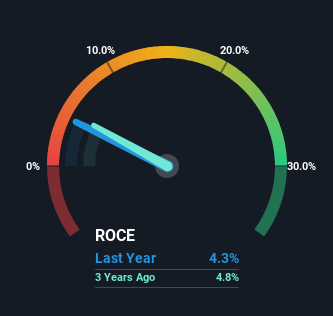- Hong Kong
- /
- Electric Utilities
- /
- SEHK:2638
Investors Met With Slowing Returns on Capital At HK Electric Investments and HK Electric Investments (HKG:2638)

Finding a business that has the potential to grow substantially is not easy, but it is possible if we look at a few key financial metrics. Firstly, we'll want to see a proven return on capital employed (ROCE) that is increasing, and secondly, an expanding base of capital employed. Put simply, these types of businesses are compounding machines, meaning they are continually reinvesting their earnings at ever-higher rates of return. However, after investigating HK Electric Investments and HK Electric Investments (HKG:2638), we don't think it's current trends fit the mold of a multi-bagger.
Return On Capital Employed (ROCE): What Is It?
For those that aren't sure what ROCE is, it measures the amount of pre-tax profits a company can generate from the capital employed in its business. To calculate this metric for HK Electric Investments and HK Electric Investments, this is the formula:
Return on Capital Employed = Earnings Before Interest and Tax (EBIT) ÷ (Total Assets - Current Liabilities)
0.043 = HK$5.0b ÷ (HK$121b - HK$4.5b) (Based on the trailing twelve months to June 2023).
Therefore, HK Electric Investments and HK Electric Investments has an ROCE of 4.3%. On its own, that's a low figure but it's around the 5.3% average generated by the Electric Utilities industry.
See our latest analysis for HK Electric Investments and HK Electric Investments

Above you can see how the current ROCE for HK Electric Investments and HK Electric Investments compares to its prior returns on capital, but there's only so much you can tell from the past. If you'd like to see what analysts are forecasting going forward, you should check out our free analyst report for HK Electric Investments and HK Electric Investments .
How Are Returns Trending?
Over the past five years, HK Electric Investments and HK Electric Investments' ROCE and capital employed have both remained mostly flat. It's not uncommon to see this when looking at a mature and stable business that isn't re-investing its earnings because it has likely passed that phase of the business cycle. So don't be surprised if HK Electric Investments and HK Electric Investments doesn't end up being a multi-bagger in a few years time. That being the case, it makes sense that HK Electric Investments and HK Electric Investments has been paying out 94% of its earnings to its shareholders. If the company is in fact lacking growth opportunities, that's one of the viable alternatives for the money.
The Key Takeaway
In summary, HK Electric Investments and HK Electric Investments isn't compounding its earnings but is generating stable returns on the same amount of capital employed. And investors appear hesitant that the trends will pick up because the stock has fallen 26% in the last five years. Therefore based on the analysis done in this article, we don't think HK Electric Investments and HK Electric Investments has the makings of a multi-bagger.
HK Electric Investments and HK Electric Investments does have some risks though, and we've spotted 2 warning signs for HK Electric Investments and HK Electric Investments that you might be interested in.
While HK Electric Investments and HK Electric Investments may not currently earn the highest returns, we've compiled a list of companies that currently earn more than 25% return on equity. Check out this free list here.
Valuation is complex, but we're here to simplify it.
Discover if HK Electric Investments and HK Electric Investments might be undervalued or overvalued with our detailed analysis, featuring fair value estimates, potential risks, dividends, insider trades, and its financial condition.
Access Free AnalysisHave feedback on this article? Concerned about the content? Get in touch with us directly. Alternatively, email editorial-team (at) simplywallst.com.
This article by Simply Wall St is general in nature. We provide commentary based on historical data and analyst forecasts only using an unbiased methodology and our articles are not intended to be financial advice. It does not constitute a recommendation to buy or sell any stock, and does not take account of your objectives, or your financial situation. We aim to bring you long-term focused analysis driven by fundamental data. Note that our analysis may not factor in the latest price-sensitive company announcements or qualitative material. Simply Wall St has no position in any stocks mentioned.
About SEHK:2638
HK Electric Investments and HK Electric Investments
An investment holding company, engages in the generation, transmission, distribution, and supply of electricity in Hong Kong Island and Lamma Island.
Fair value with questionable track record.
Similar Companies
Market Insights
Community Narratives




